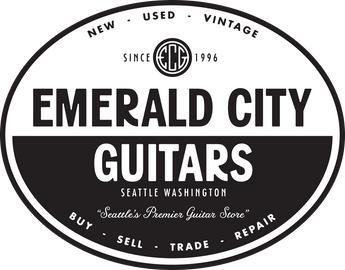









1979 Fender Stratocaster
1979 Fender Stratocaster in original Antigua finish. A great example of a CBS Stratocaster displaying a cool relic'd aesthetic with headstock checking, worn edges, and typical neckwear for a guitar that's been loved and played. Sounds great with a resonant tone and plays amazingly with a replaced nut and updated frets for a more modern feel. Other than the frets and replaced nut the only other modification is some evidence of solder repair, otherwise, this Antigua Strat is stock and in great shape! Includes original hardshell case.
Check out the feature from our luthier Tyler in the ECG Newsletter:
"Fender custom colors of the 1960s, and indeed custom colors from all guitar manufacturers, were curated with the intent to be as marketable as possible. This makes sense. Most major companies, including Fender, took cues from the auto industry. Surf Green was a Chevy color from 1956. Lake Placid Blue was made available on any Cadillac from 1958. Fiesta Red? Odds are you’d been coveting your neighbor’s ’56 Thunderbird in the same shade. If the public would spend thousands on a boldly finished car, why wouldn’t they jump at the chance to outfit their guitars in a similar fashion for a nominal fee? This inspired bit of foresight by the Fender company made their custom options a successful and profitable venture. By the end of the 60s, though, Leo Fender was long gone and any bit of residual foresight regarding tasteful finish options was quickly evaporating.
Fender’s Antigua sunburst was devised as so many sunbursts are — as a clever way to hide some mistake in the manufacturing process. (I consider the accidental shadetop to be a time-honored tradition of lutherie and can’t think of a single builder who hasn’t at some point been forced to partake.) The story goes that upon the introduction of the Coronado in 1966, something about Fender’s body binding process caused an intermittent, black discoloration around the rim of the instrument. Rather than scrap hundreds of bodies, they turned this flaw into a feature: the Antigua. While the shaded edges are reminiscent of Fender’s earlier guitars, the decision was made to take the center of the burst in a different direction. Transparent finish may have done the trick for your dad’s old Strat, but CBS was sure that the future was decidedly opaque. The resulting black-to-custard fade would go on to don most of Fender’s models and become one of the guitar world’s most polarizing aesthetics. As for me? I’d certainly take one over a silverburst Gibson or a Wildwood Coronado.
The Antigua Fender isn’t a terribly common sight at any vintage guitar shop, but having a collection of 4 at one time is something I’ve never seen before. The Coronado II is dated February 1968, making it a relatively early example of the fabled colorway. The Tele Custom and Strats are from 1978 and 1979, respectively, and are nearly all original with one of the Strats showing evidence of a refret and replaced nut. Wherever you fall on the spectrum of Antigua tolerance, it is undeniable that this unique finish paved the way for countless other outrageous aesthetic ideas that would follow until the present day. If you find yourself drawn to what some call Fender’s “phlegm burst,” feel free to come by the shop and try out all four." - Tyler Geske










